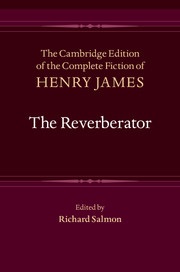Book contents
- Frontmatter
- Contents
- List of Illustrations
- Acknowledgements
- List of Abbreviations
- General Editors’ Preface
- General Chronology of James’s Life and Writings
- Introduction
- Textual Introduction
- Chronology of Composition and Production
- Bibliography
- The Reverberator
- Glossary of Foreign Words and Phrases
- Notes
- Textual Variants I : Substantive Variants up to Copy Text
- Textual Variants II : Substantive Variants after Copy Text
- Emendations
- Appendices
Appendix B - Extract from James’s Notebooks
Published online by Cambridge University Press: 23 April 2021
- Frontmatter
- Contents
- List of Illustrations
- Acknowledgements
- List of Abbreviations
- General Editors’ Preface
- General Chronology of James’s Life and Writings
- Introduction
- Textual Introduction
- Chronology of Composition and Production
- Bibliography
- The Reverberator
- Glossary of Foreign Words and Phrases
- Notes
- Textual Variants I : Substantive Variants up to Copy Text
- Textual Variants II : Substantive Variants after Copy Text
- Emendations
- Appendices
Summary
Henry James's Notebooks are collected in Volume XXXIV of The Complete Fiction of Henry James. The editor of that volume, Philip Horne, has excerpted and prepared the text for this Appendix, and has supplied essential annotations. The following passage is drawn from the first volume of James's notebooks in the Houghton Library, Harvard (MS Am 1094 (v. 1). This volume of the notebooks runs from 7 November 1878 to 11 March 1888.
London;Thursday November 17th 1887.
Last winter, in Florence, I was struck with the queer incident of Miss McC.'s writing to the New York World that inconceivable letter about the Venetian society whose hospitality she had just been enjoying – & the strange typicality of the whole thing. She acted in perfect good faith & was amazed, & felt injured & persecuted, when an outcry & an indignation were the result. That she should have acted in good faith seemed to me to throw much light upon that mania for publicity which is one of the most striking signs of our time. She was perfectly irreflective & irresponsible, & it seemed to her pleasant & natural & “chatty” to describe, in a horribly vulgar newspaper, the people she had been living with & their personal domestic arrangements & secrets. It was a striking incident & it seemed to me exactly the theme for a short story. One sketches one's age but imperfectly if one doesn't touch on that particular matter: the invasion, the impudence & shamelessness, of the newspaper & the interviewer, the devouring publicity of life, the extinction of all sense between public & private. It is the highest expression of the note of “familiarity”[,] the sinking of manners, in so many ways, which the democratization of the world brings with it. I was prompted to make use of the incident in question, which struck me [as] a very illustrative piece of contemporary life – the opposition of the scribbling, publishing, indiscreet, newspaperized American girl & the rigid, old-fashioned, conservative, still shockable & much shocked little society she recklessly plays the trick upon. The drama is in the consequences for her – & it is of course interesting in proportion as the consequences are great.
Information
- Type
- Chapter
- Information
- The Reverberator , pp. 285 - 289Publisher: Cambridge University PressPrint publication year: 2018
